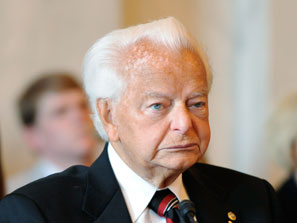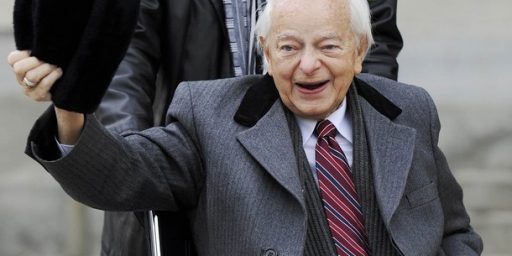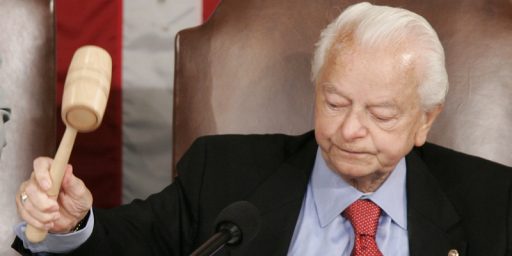Byrd: Czars Executive Power Grab
 Old Man Byrd is at it again:
Old Man Byrd is at it again:
West Virginia Sen. Robert C. Byrd, the longest-serving Democratic senator, on Wednesday criticized President Barack Obama’s appointment of White House “czars” to oversee federal policy, saying these executive positions amount to a power grab by the executive branch.
Byrd complained in a letter to the president that his decision to create White House offices on health care reform, urban affairs policy, and energy and climate change “can threaten the constitutional system of checks and balances. At the worst, White House staff have taken direction and control of programmatic areas that are the statutory responsibility of Senate-confirmed officials.”
You’ve got to hand it to the man: He’s at least consistent. While I’m often critical of him, not least for his own “power grab” in bringing home to West Virginia much more than its fair share of federal taxpayer money, he is in many ways exactly what the Framers envisioned when creating the Senate. He is keenly interested in protecting his own power base, jealously guarding it from encroachment. That’s exactly as James Madison intended (see Federalist 10).
In this particular case, Byrd’s probably wrong. I’m not a fan of “czars” to deal with public policy problems, either. But, despite their unfortunately autocratic nickname, the problem is actually precisely the opposite: They have too little power to get anything done.
When was the last time you heard from Doug Lute, the 3-star “war tsar” that Bush appointed and Obama has retained? Compared to CENTCOM honcho David Petraeus, JCS chair Mike Mullen, SECDEF Bob Gates, SecState Hillary Clinton, NSA Jim Jones, and others, he’s got no budget, no staff, no authority, and no access to the president.
So it goes with “tsars.” They need the cooperation of cabinet level officers who actually control the necessary resources. Given that they’ve typically got huge egos and have given up much more lucrative gigs in order to make a difference in public policy, they tend not to be very cooperative with people who don’t answer to the name “Mr. President.”






Exactly. We need more of that. The legislative branch should be jealously contesting with the executive branch for power rather than rolling over as they did for Bush.
Well, natch. He’s a lot closer to them than the rest of us.
“Czars” is an ironic name since the actual tsar’s power was absolute and handed out, presumably by the Almighty, while what little power our governmental czars have is given them by the executive. Or the Congress. Or both.
The problem is that our government, outside of the Pentagon where IIRC the idea originated, is incapable of dealing with matrix managers. It’s too hierarchical.
From some other article:
I don’t know, I’m sort of with Byrd on this one. Or perhaps it’s just because we’ve been being burned with this executive privilege crap in recent history.
Sure, as long as Congress votes to prohibit its members from using legislative privilege to thwart criminal investigations.
Bobby “Sheets” Byrd is warm, but not hot.
For one, Sheets is wrong to imply that calling a mere presidnetial advisor a czar some how creates some new and magical presidential authority. You can call a presidential advisor anything you like, he only excersite the power of the President. That is to say, if the President lacks authority, so does any advisor, so-called czar, acting his his name.
The real problem is not the creation of so-called czars but rather Presidents attampting to exercise authority which they simply do not have. For example, BO wants to run the Census from the White House basement. Yet the authority to run the Census was given by Congress to Commerce Department. The power grab, not the naming, that is the problem.
I don’t expect too much complaining from Congress aside from Sheets.
I am with David, frankly, on the idea of it being safest not to trust Byrd with much of anything. At the same time, he’s also correct in terms of Obama overstepping.
This speaks to the futility of Obama’s claimed plan to limit congresional spending, earmarks in particular. It’s clear that while he has little ability to stand up to his own party, they certainly plan to stand up to him on that issue.